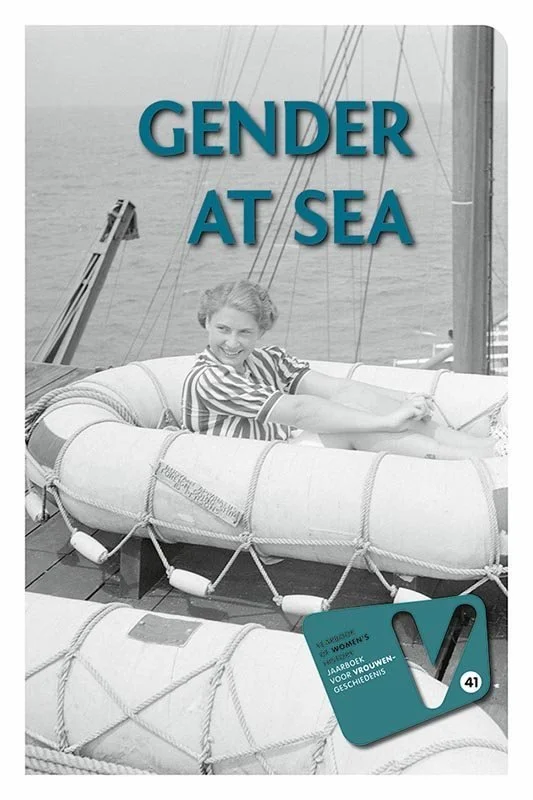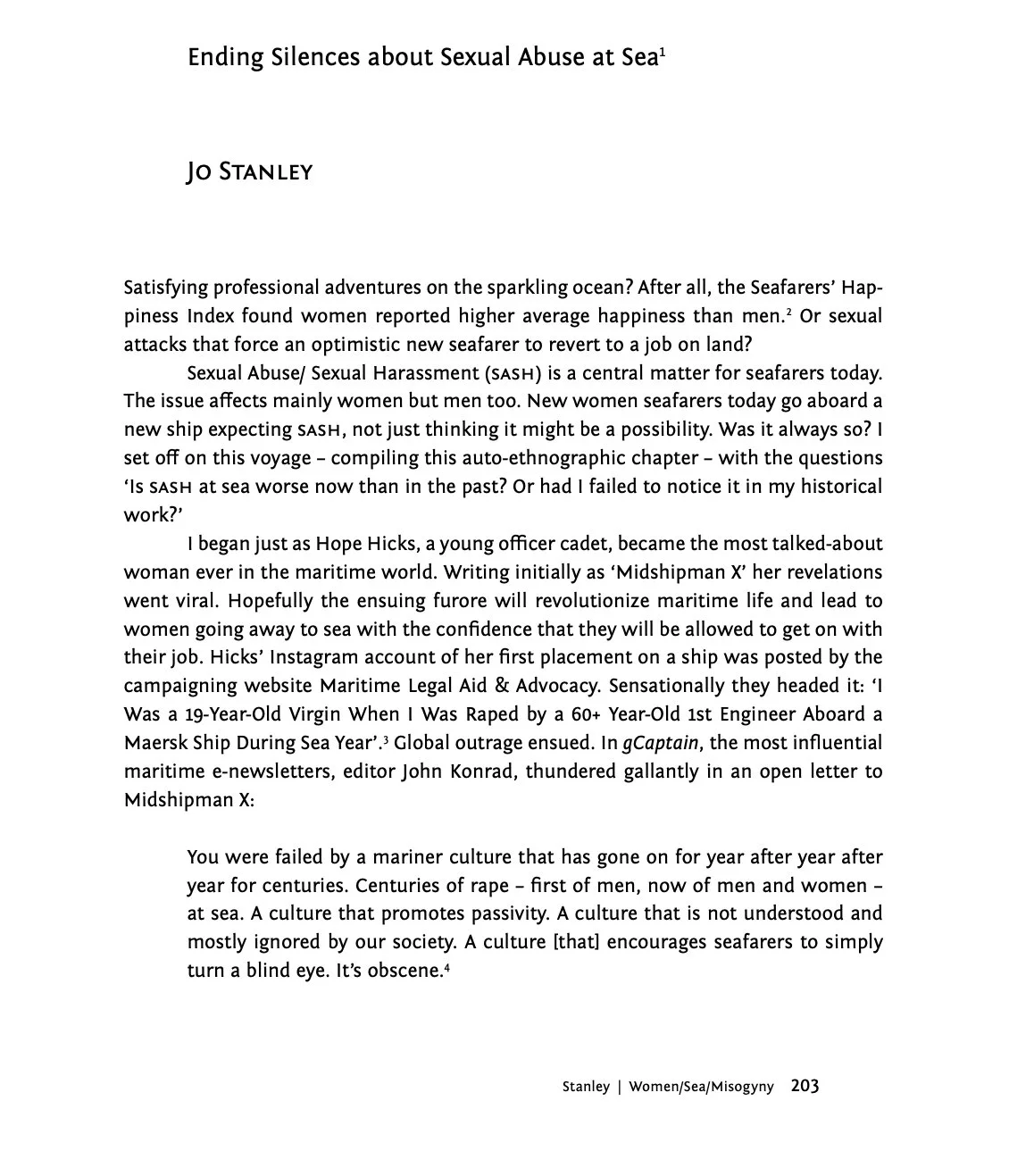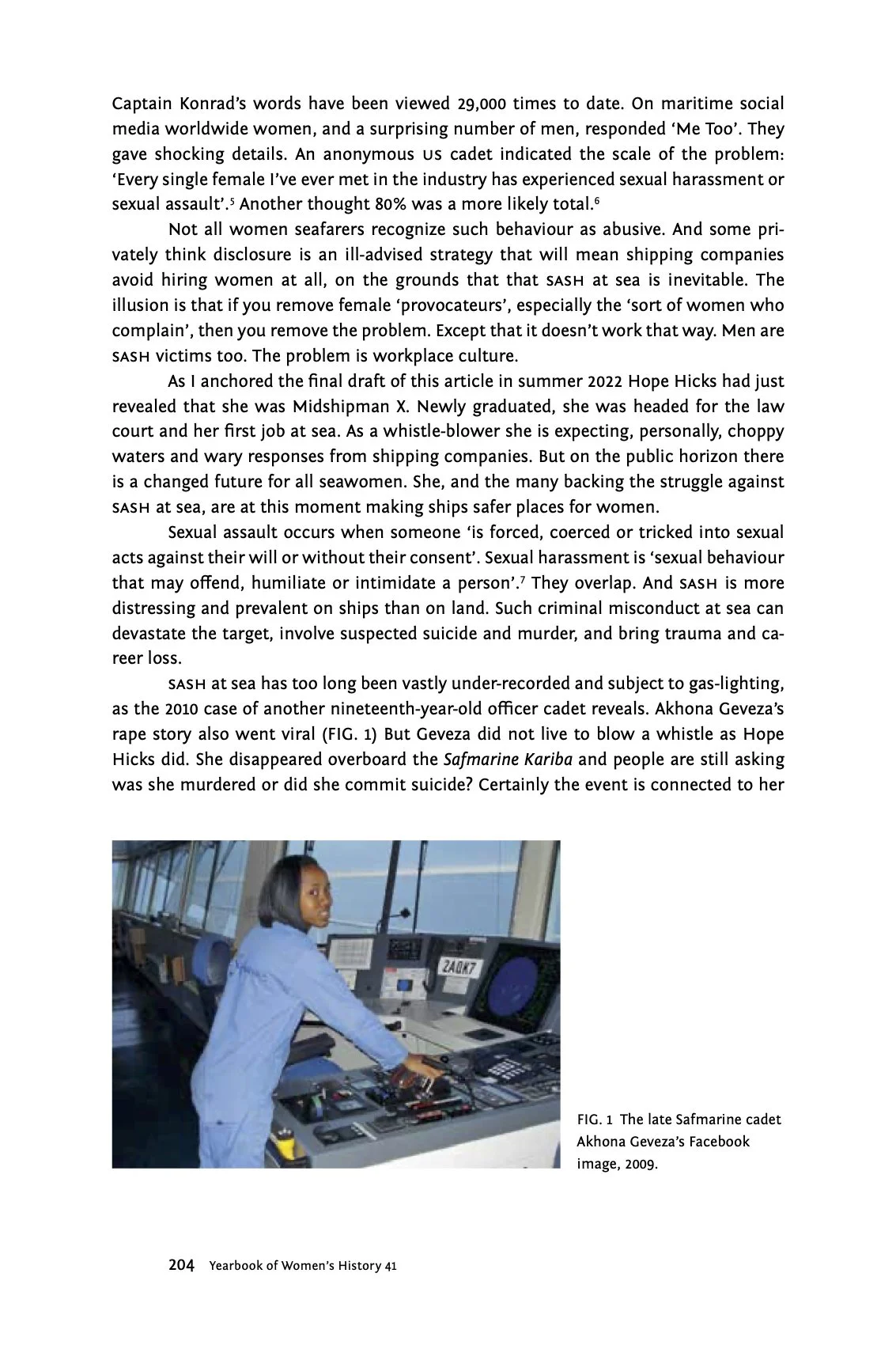In New Book, Maritime Historian Calls Hope Hicks “the most talked-about woman EVER in the maritime world” & Expresses Optimism Hicks’ Bravery Will Lead to a Revolution in Maritime Life
By: MLAA
“Gender at Sea,” a multi-authored, multinational book focusing on women in maritime life has recently been published in the Netherlands. According to the publisher:
“For centuries seafaring people thought that the presence of women on board would mean bad luck: rough weather, shipwreck, and other disasters were sure to follow. Because of these beliefs and prejudices women were supposedly excluded from the maritime domain…this volume moves from Indonesia to the Faroe Islands, from the Mediterranean to Newfoundland; bringing to light the presence of women and the workings of gender on sailing, whaling, steam, cruise, passenger, pirate, and navy ships. As a whole it demonstrates the diversity and the agency of women at sea from ancient times to the present day.
One chapter of the book is written by maritime historian and activist Jo Stanley, who has also posted a contents list of the book on her blog “Gendered Seas.”
MLAA is publishing an excerpt of Jo Stanley’s essay from the newly released book. The essay and excerpt touch on some of the work done by MLAA and on the importance of Hope Hicks’ whistle-blowing and activism to the fight to change the global maritime industry.
Stanley’s essay is titled:
Ending Silences about Sexual Abuse at Sea.
By: Jo Stanley
…Sexual Abuse/ Sexual Harassment (sash) is a central matter for seafarers today. The issue affects mainly women but men too. New women seafarers today go aboard a new ship expecting sash, not just thinking it might be a possibility. Was it always so? I set off on this voyage – compiling this auto-ethnographic chapter – with the questions ‘Is sash at sea worse now than in the past? Or had I failed to notice it in my historical work?’
I began just as Hope Hicks, a young officer cadet, became the most talked-about woman ever in the maritime world. Writing initially as ‘Midshipman X’ her revelations went viral. Hopefully the ensuing furore will revolutionize maritime life and lead to women going away to sea with the confidence that they will be allowed to get on with their job. Hicks’ Instagram account of her first placement on a ship was posted by the campaigning website Maritime Legal Aid & Advocacy. Sensationally they headed it: ‘I Was a 19-Year-Old Virgin When I Was Raped by a 60+ Year-Old 1st Engineer Aboard a Maersk Ship During Sea Year’. Global outrage ensued.
In gCaptain, the most influential maritime e-newsletters, editor John Konrad, thundered gallantly in an open letter to Midshipman X:
You were failed by a mariner culture that has gone on for year after year after year for centuries. Centuries of rape – first of men, now of men and women – at sea. A culture that promotes passivity. A culture that is not understood and mostly ignored by our society. A culture [that] encourages seafarers to simply turn a blind eye. It’s obscene.
Captain Konrad’s words have been viewed 29,000 times to date. On maritime social media worldwide women, and a surprising number of men, responded ‘Me Too’. They gave shocking details. An anonymous us cadet indicated the scale of the problem: ‘Every single female I’ve ever met in the industry has experienced sexual harassment or sexual assault’. Another thought 80% was a more likely total.
Not all women seafarers recognize such behaviour as abusive. And some privately think disclosure is an ill-advised strategy that will mean shipping companies avoid hiring women at all, on the grounds that that sash at sea is inevitable. The illusion is that if you remove female ‘provocateurs’, especially the ‘sort of women who complain’, then you remove the problem. Except that it doesn’t work that way. Men are sash victims too. The problem is workplace culture.
As I anchored the final draft of this article in summer 2022 Hope Hicks had just revealed that she was Midshipman X. Newly graduated, she was headed for the law court and her first job at sea. As a whistle-blower she is expecting, personally, choppy waters and wary responses from shipping companies. But on the public horizon there is a changed future for all seawomen. She, and the many backing the struggle against sash at sea, are at this moment making ships safer places for women.


